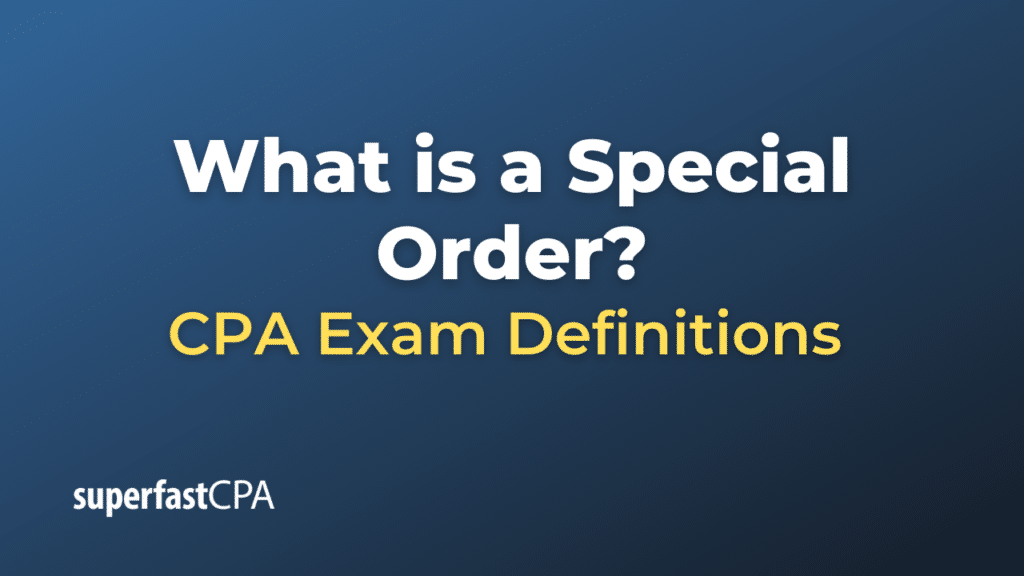Special Order
In the context of business and accounting, a special order refers to a one-time order from a customer that is not part of the company’s usual sales transactions. Special orders often come with specific conditions that are different from regular orders, such as a different price, unique specifications, or special delivery terms.
Here are some characteristics and considerations regarding special orders:
- Pricing: The price for a special order might be lower than the usual selling price, especially if the order quantity is large. However, businesses should ensure that the price covers at least the variable costs associated with the order.
- Capacity: Before accepting a special order, a company should assess whether it has the production capacity to fulfill the order without affecting its regular operations.
- Costing: The company should consider both variable and fixed costs when deciding on a special order. If the order can cover the variable costs and contribute to fixed costs, it might be beneficial, especially if the company has excess capacity.
- Impact on Regular Business: Sometimes, a special order might require prioritization over regular orders. The company should assess the implications of this on its regular customers and operations.
- Non-financial Factors: Non-financial considerations, such as the potential for future business from the customer, the impact on the company’s reputation, or strategic positioning, should also be taken into account.
Example of a Special Order
Let’s dive deeper into a practical example of a special order scenario:
Situation:
Bright Sofas Inc., a furniture manufacturer, typically produces and sells luxury sofas to upscale furniture stores at a price of $1,500 per sofa. Their production process is running at 80% capacity, so there’s room for more production if needed.
One day, a new hotel chain, RelaxInn Hotels, approaches Bright Sofas Inc. with a special order. They need 100 luxury sofas for their new hotel but request a discounted price of $1,200 per sofa due to the bulk order. RelaxInn Hotels also has specific fabric and design requirements for these sofas, slightly different from the standard design.
Financial Breakdown:
- Standard Costing:
- Variable cost per sofa: $800 (materials, direct labor, variable overhead)
- Fixed overhead: $100,000 monthly (spread over typical production of 500 sofas, this is $200 per sofa)
- Profit margin at standard price: $1,500 – $800 – $200 = $500 per sofa
- Special Order Costing:
- Variable cost remains $800 per sofa.
- No additional fixed costs since the company isn’t operating at full capacity.
- Contribution margin at special order price: $1,200 – $800 = $400 per sofa
Analysis:
Given the order size of 100 sofas:
- The company would earn additional revenue of $120,000 ($1,200 x 100).
- The total variable cost for the order: $80,000 ($800 x 100).
- Total contribution to fixed costs and profit: $40,000 ($400 x 100).
Decision Points:
- Financial Consideration: The special order contributes $400 per sofa, which is $100 less than their standard order. However, it offers a total contribution of $40,000 without incurring extra fixed costs. This seems favorable.
- Capacity: The company is running at 80% capacity, so they can accommodate this order without disrupting their regular production.
- Future Business Potential: Accepting this order could open doors for future business with RelaxInn Hotels as they expand and require more furniture.
- Reputation and Brand Image: If the special fabric and design meet the company’s quality standards, there won’t be any damage to the brand’s reputation.
- Opportunity Cost: By taking this order, the company would use 20% of its idle capacity. If there’s no other potential business that offers a higher profit margin in the horizon, this seems like a good use of their resources.
Conclusion:
Considering all the factors, Bright Sofas Inc. might decide to accept the special order from RelaxInn Hotels as it provides a significant contribution to their profits, makes good use of their idle capacity, and potentially paves the way for future business opportunities.













